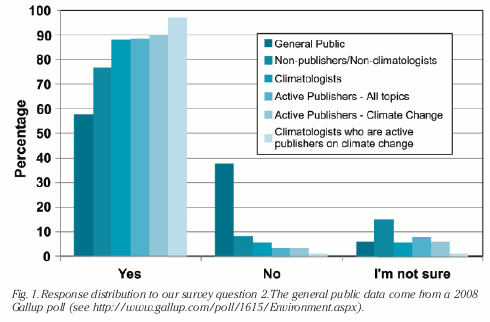You hear the term “scientific consensus” thrown around all the time in climate change. Al Gore claims absolute consensus. Many skeptics claim none at all. Earlier this year, Peter Doran and his student Maggie Zimmerman, from the University of Illinois, published the results of a poll aimed at quantifying the degree of scientific agreement on climate change.
Peter Doran is a publishing climatologist, so he falls into the most credible category of individuals on our credibility spectrum. The poll was published in EOS, a publication of the American Geophysical Union. EOS is a peer-reviewed journal, which falls even higher on our credibility spectrum than a publishing climatologist. I think we can establish strong credibility for this poll.
Examining the Scientific Consensus on Climate Change (click on the link for the most complete summary you can get without an EOS account) polled 3146 Earth scientists on their opinion on climate change. The summary describes the details of how the poll was carried out, for anyone who is questioning objectivity.
First, the poll asked, “When compared with pre-1800s levels, do you think that mean global temperatures have risen, fallen, or remained relatively constant?” Overall, 90% of participants answered “risen”, as did 96.2% of actively publishing climatologists, the highest level of specialization categorized in the study.
The second question asked, “Do you think human activity is a significant contributing factor in changing mean global temperatures?” As seen below, 82% of participants answered “yes”, as did 97.4% of actively publishing climatologists. Note that the darkest blue bar represents the general public, as seen in a recent Gallup poll.

Do you think human activity is a significant contributing factor in changing mean global temperatures?
The poll noted that the level of agreement on anthropogenic global warming increased with the level of specialization. They also noted that the public perception of debate was, obviously, largely unfounded. We’ll be talking a lot more about perceived debate in the weeks to come here at ClimateSight.
The results of this poll are not surprising to me. In a way they make me happy, as they confirm that my previous perception of scientific agreement was well founded. But they also make me sad. 97% of the world’s most qualified individuals on this topic agree that we’re affecting the climate – something which is generally very negative as, with climate, stability is best. As David Suzuki said, “We are playing a crap game with the only home we have.”

I think it’s interesting that the most uncertain group is non-publishing scientists. At first glance, it seems like the public should be the most uncertain. But when you think about it, scientists make it their job to be uncertain. So even though they are much more informed than the average person, many of them know how much they don’t know.
That’s a very interesting perspective, and one I hadn’t considered. I swear my commenters are teaching me even more about the topics I thought I understood.
Define “significant”
You’d have to ask the authors if you wanted an exact definition of their interpretation of “significant” for the study. But if you were asking me, “significant” in this context means:
1) releasing more greenhouse gases than carbon sinks can absorb
2) causing a radiative forcing which is not balanced by an opposing factor
3) influencing a change in temperatures which is faster and more dramatic than natural variability
4) causing changes in climate which threaten our food security, water security, economic stability, public health, political relations, and quality of life.
Why is this no longer on the “noteworthy posts” list?
I am now using the “Top Post” feature instead of the “Noteworthy Posts” list. What’s your opinion on that – should I switch back?
[citations needed – Greenpeace manufactured evidence]